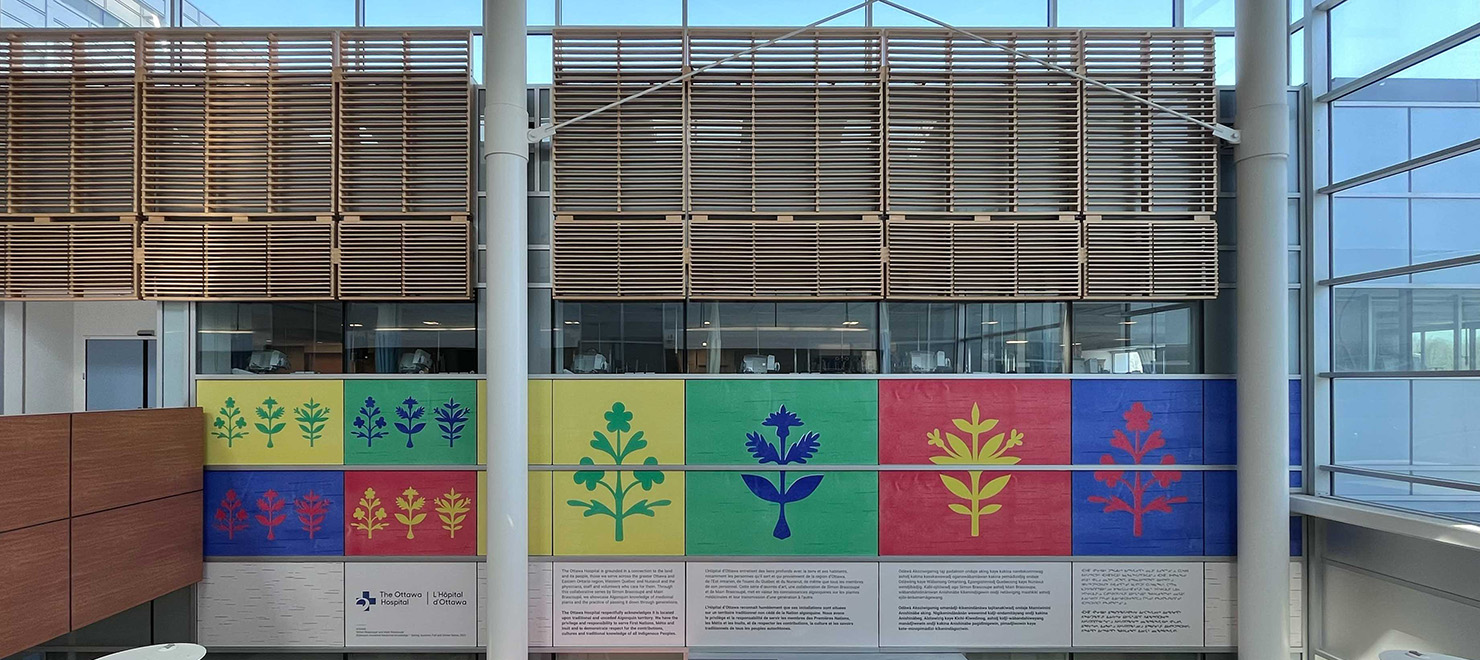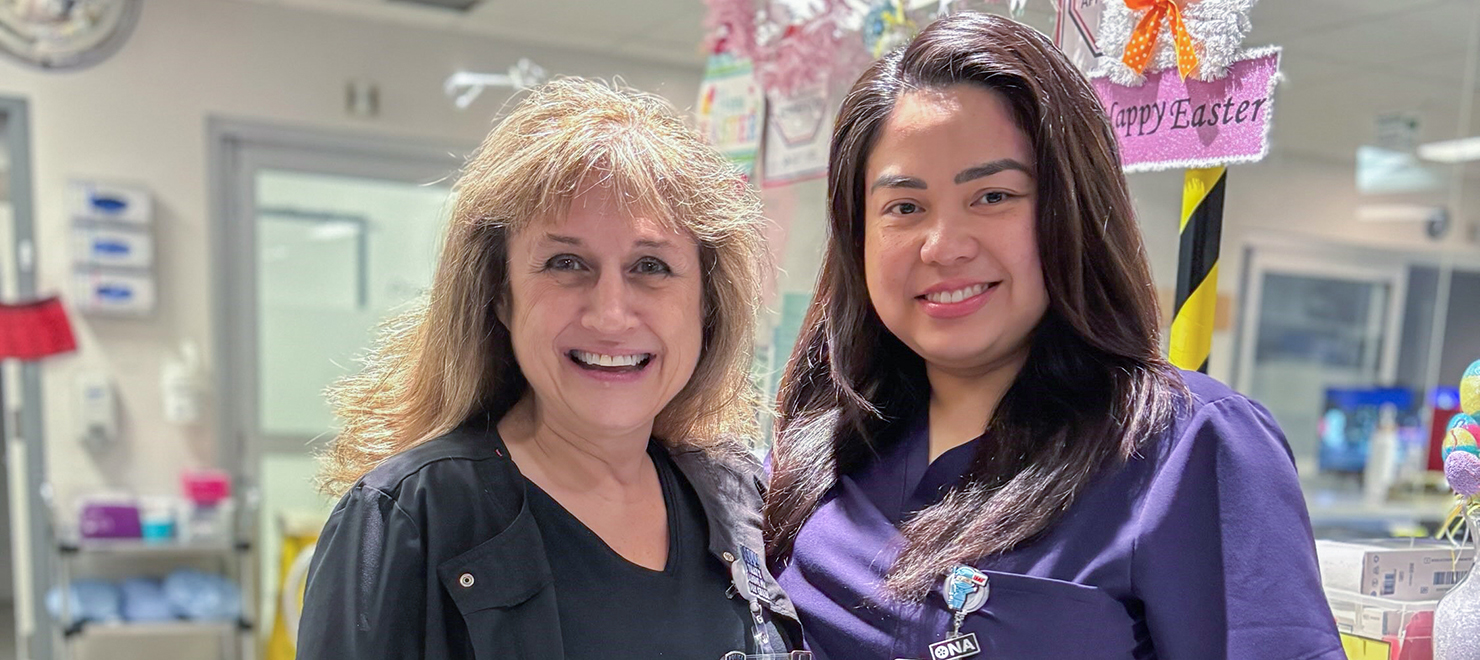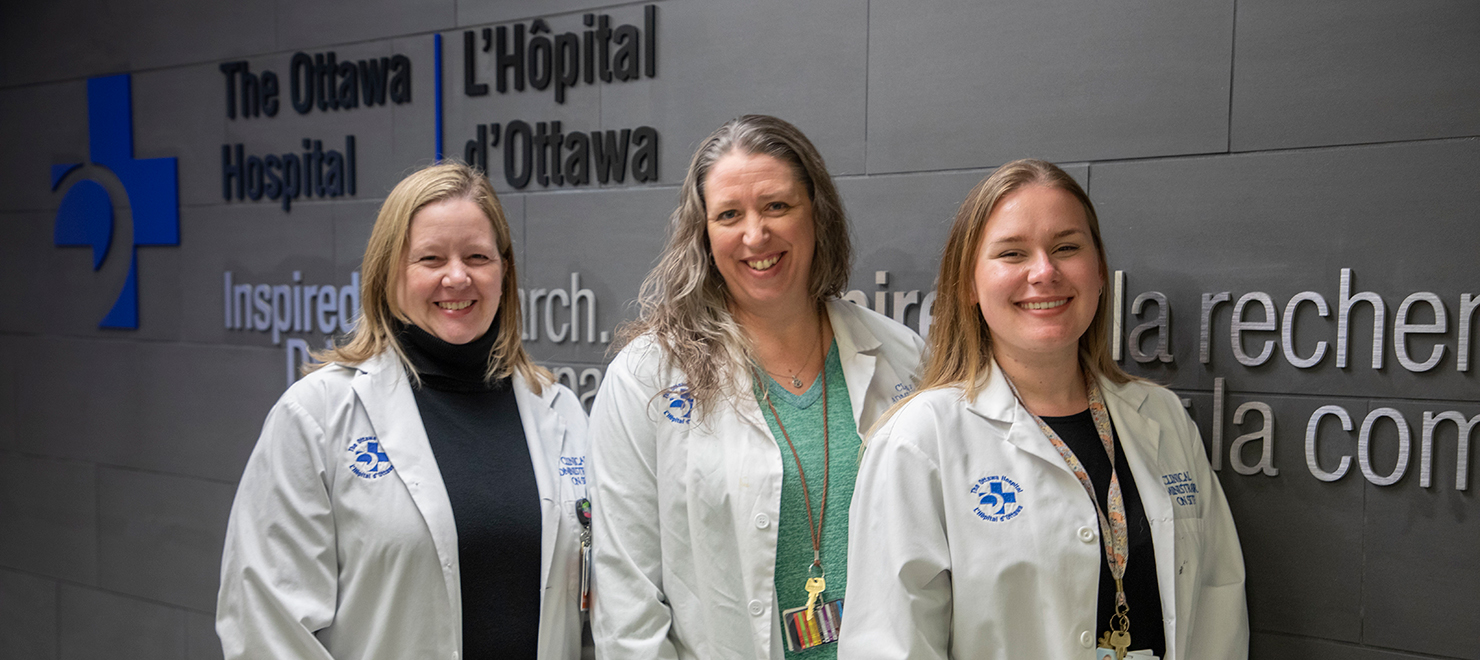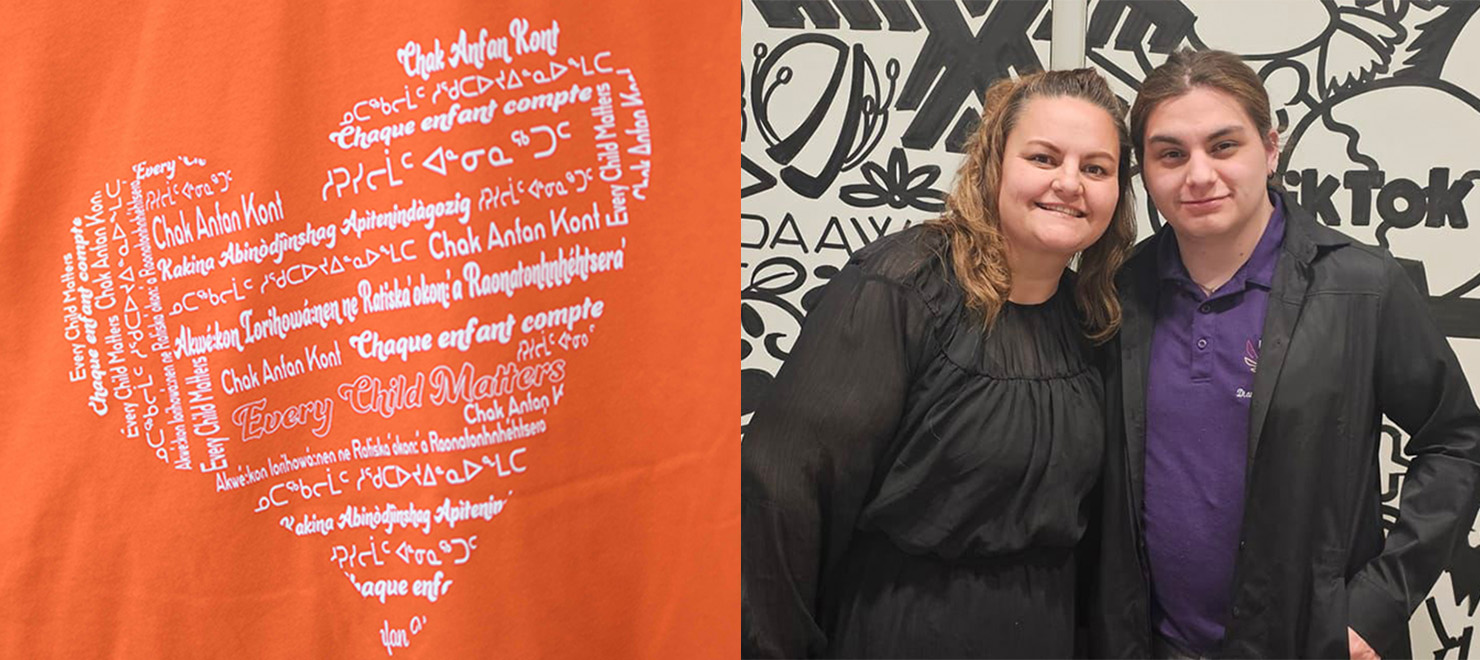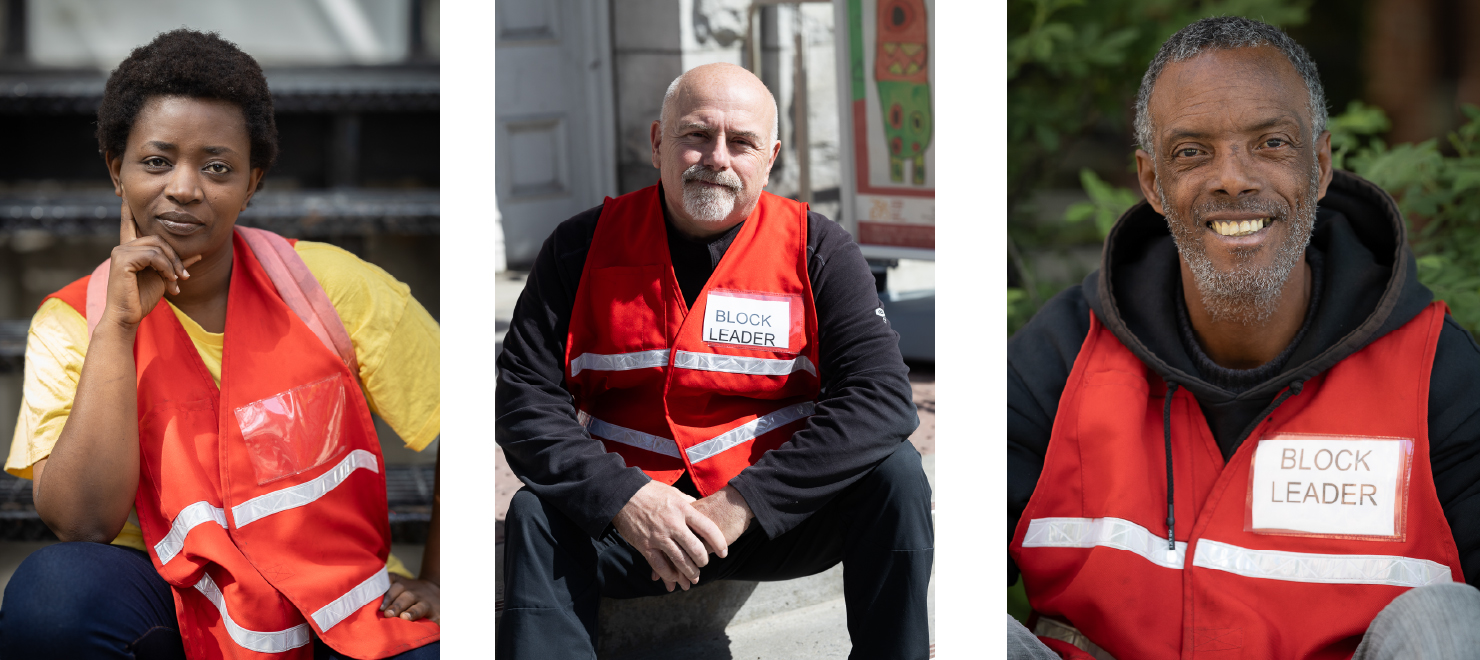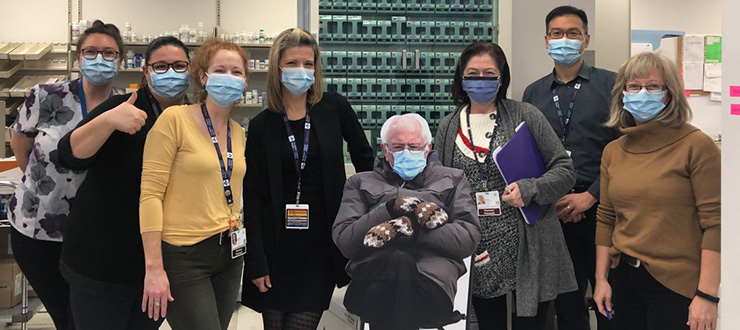
The last time you spoke to a pharmacist or pharmacy professional may have been at a local drugstore or community pharmacy, but did you know that The Ottawa Hospital has nearly 100 pharmacists and more than 200 pharmacy technicians and assistants on staff? Their expertise in handling, preparing and answering questions about medication safety is especially important in the COVID-19 vaccine rollout across Ottawa.
Experts in handling the ultra-low temperature Pfizer vaccine safely
The Pfizer COVID-19 vaccine is delivered to The Ottawa Hospital already frozen at an ultra-low temperature (-70oC) and needs to be stored at that temperature until it is ready to be thawed, diluted and prepared into individual doses.
But where could the vaccine be stored safely? The Ottawa Hospital had something special that most public health units didn’t at the time.
“When the Pfizer vaccine was first approved in Canada and the first doses were arriving, Ontario Health looked to The Ottawa Hospital to store the vaccine because we were equipped with specialized freezers and were familiar with handling medical products stored in cold temperatures,” said Alex Kuo, Director of Pharmacy at The Ottawa Hospital.
But storage was just the start of how pharmacy professionals supported the COVID-19 vaccine rollout in Ottawa. Pharmacy technicians and assistants were also called on to help prepare the vaccine into individual doses.
Preparing the Pfizer vaccine: a team effort
On a typical day, The Ottawa Hospital’s pharmacy prepares 1,000 COVID-19 vaccine doses, but it has prepared as many as 1,700 for The Ottawa Hospital’s vaccination clinic and for eligible inpatients.
“We are able to support the high capacity needed for a rapid rollout,” explained Alex. “We have the capability to manage the workflow, and we have the sterile environment needed to get the preparation done safely.”
The pharmacy team is a big reason why the vaccination clinic can handle such high daily demands.
“Pharmacy technicians and assistants have been instrumental and helping to produce the vaccines for the clinic,” said Alex. “We’ve recognized that from day one, and without them, this obviously wouldn’t be possible.”
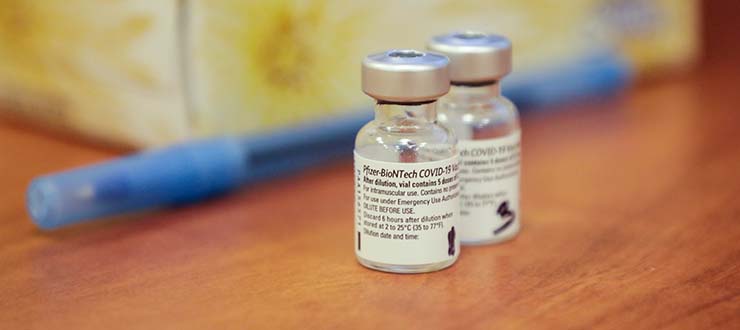
The pharmacy team at The Ottawa Hospital prepares 1,000 doses of the Pfizer COVID-19 vaccine daily for eligible people in Ottawa in addition to preparing about 2,000 other medications for patients each day.
Always looking ahead to provide the best care today
In addition to preparing the COVID-19 vaccine, pharmacists are constantly looking for therapies that can be used to support COVID-19 patients, and they quickly adapt as the availability of those therapies changes over time without impacting patient care.
When a lot of attention is paid to potential therapies, pharmacists help to clarify evidence and risks around medication use. This has been especially important in the evolving treatments for COVID-19.
Pharmacists have also worked together to develop conservation strategies.
“Pharmacists proactively recommend optimal medication therapies,” explained Alex. “And when supply is challenged, they consider other safe and effective alternatives based on availability.”
That discussion can extend regionally and provincially, where hospital pharmacists work together to make sure everyone has what they need to best care for patients.
“A lot of hospitals have used their regional networks to have these greater discussions, and to develop plans in the event that a medication is in high demand with limited supply,” he said.
An example of that came in the summer of 2020 when a medication called propofol, which is used in the ICU as a sedative, was in short supply from the manufacturers. Pharmacy leads across the region and province started looking at whether they could safely use the same medication but in a higher concentration. The result was that by limiting the use of the higher concentration to the GTA, there was no impact to the propofol supply across the rest of Ontario.
“If we need to shift supply from a regional and an ethical sharing perspective, we can support our colleagues and patients,” said Alex. “We’re thinking outside the box; we’re looking at alternatives, and we make contingency plans in an attempt to be ready for what may lie ahead.”
Promoting vaccine confidence
Pharmacists like Alex also work closely with other medical staff and patients in the hospital to provide expertise about the COVID-19 vaccine and other medications.
“The messenger RNA (mRNA) vaccine may be new and unfamiliar to many patients, so we are there along with their medical team to answer those questions so patients can feel confident about getting the vaccine,” he said.
There for all patients, always
People may not realize that The Ottawa Hospital’s pharmacy team is doing all of their activities related to the COVID-19 vaccine rollout on top of supporting our normal operations by preparing oral and IV medications for patients at the hospital, educating health-care professionals and patients about medications, and conducting research.
“People know their community pharmacists, but may not be aware of the pharmacists and pharmacy professionals’ proactive role in their care while in hospital.” said Alex.

Support patient care and research at
The Ottawa Hospital
You might also like…
A guide to services at The Ottawa Hospital for Indigenous patients and families
At The Ottawa Hospital, we are committed to providing culturally safe care for First Nation, Inuit and Métis patients and families. We are working with Indigenous partners to identify ways we can make your time in hospital more welcoming. Here are some of the ways we’re doing that now.
Novice nurses and their mentors learn and grow together
Discover how mentorships at The Ottawa Hospital facilitate a smoother transition into practice for novice nurses, allow experienced nurses to hone their leadership skills, and play a crucial role in retaining nurses from both generations.
Meet the team that brings CAOS every night
Don’t let the CAOS team’s name fool you. Find out how these nighthawks help make sure everything runs smoothly at our campuses and satellite sites after hours.
These nurses invite you to recycle their idea
At The Ottawa Hospital, we strive to lead in sustainable health care — something we can only achieve with the help of our frontline staff. Geriatric medicine nurses Caiti and Sabrina rallied their unit together to optimize recycling and divert waste from the landfill. Find out how they binned it to win it (And we can’t promise you that that’s the last recycling pun in this article!).
More than a shirt: Orange shirts support healing and community
Pamela Meness, owner of Diamond Phoenix Creations, the Kitigan Zibi-based supplier of The Ottawa Hospital’s Every Child Matters orange t-shirts, says her business is about healing and community.
“It’s about giving them hope and purpose”: Ottawa Inner City Health’s Block Leaders program marks one year serving the community
Seven days a week, Block Leaders head out into the ByWard Market to help fellow members of their community who are unhoused or use drugs. They provide support to people in distress, respond to overdoses and even clean their neighbourhood — all with the goal of creating a safer and healthier community for everyone.


 To reset, hold the Ctrl key, then press 0.
To reset, hold the Ctrl key, then press 0.
